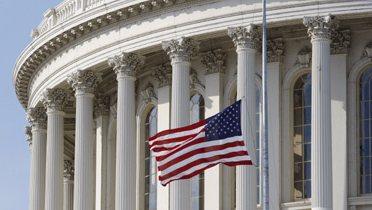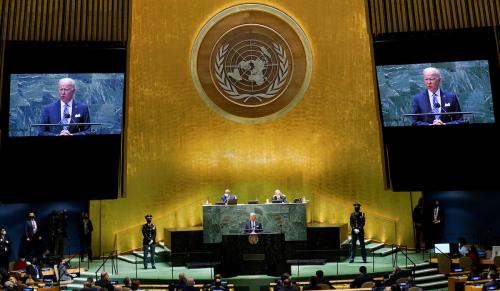By the end of last year, several major economies in the European Union were sinking back into a slump. The United Kingdom now is officially in a double-dip recession. With unemployment approaching 25 percent, Spain seems headed for a depression. Meanwhile, the U.S. economy was on its way to recovery through 2011, and at least posted a 2.2 percent rate of growth in the first quarter of this year.
Could it be that, for all the laments about America’s “gridlocked” and “broken” political system, it actually appears to have done a better job contending with the Great Recession and its aftermath than did many other advanced democracies? Increasingly, it looks that way. The comparatively favorable performance, moreover, may well have much to do with the actions that our system impeded, not just the actions that it permitted.
In its own quirky fashion, the U.S. government managed to avoid the trap that several European countries have fallen into: initiating severe austerity measures in a fragile economy. How come? In part, some countries in Europe have had less choice in the matter. There, the bond market had already begun forcing their hand, whereas (at least as of now) lucky America has been able to continue financing its deficit-spending at low rates of interest. Yet, that is not the whole story. Unlike, say, the British parliamentary model—so admired for its capacity to act decisively—our separation of powers, with its sometimes frustrating checks and balances, blocked precipitous budget-cutting and tax increases.
Thus, when the House of Representatives adopted a relatively stringent budget resolution in April, 2011, the Senate declined to go along. Later, during the showdown over raising the debt ceiling, the House passed a bill that called for only a short-term increase in the debt limit, and that conditioned any further increase on specific cuts in discretionary spending, plus, for good measure, passage of a balanced-budget amendment. Again, the Senate rebuffed the House. The trouble with the House’s approach was not that it was pressing for greater spending restraint, only that it was in too much of a rush. Prudent retrenchment needs to be back-loaded.
The eventual result of this bicameral thrust-and-parry was the Budget Control Act, a compromise that has kept government spending essentially the same in fiscal 2012 as in the previous fiscal year. For the time being, this has been the right medicine. About the last thing the still-frail economy needs at the moment is an immediate heavy dose of fiscal frugality.
A similarly useful stasis had occurred during 2010. Congress’s annual budget process had fallen to pieces earlier in the year, thanks to that biennial American peculiarity: the upcoming mid-term election. No budget resolution for fiscal 2011 emerged. Not only that, but no regular appropriations bills were enacted, either. What a mess! Right?
Wrong. The upshot was that government spending largely continued at fiscal 2010 levels through the first part of the following year—enough space for the teetering economy then to dodge the bullet of possible ill-timed budgetary reductions.
One might be tempted to infer that sound counter-cyclical outcomes have only been the handiwork of a Keynesian president and his Democratic majority in the Senate which duly stiffed the House’s many Republican skeptics of Keynes.
Not exactly. The inconvenient truth, which many liberals don’t seem to acknowledge, is that the GOP is not consistently anti-Keynesian. Particularly in a weak economy, just about every Republican (in stark contrast, for example, to most British Tories) has insisted that any tax increase would be a pro-cyclical “job killer.” Thus, wise temporary extensions of the Bush-era tax cuts at the end of 2010 received bipartisan support. Indeed, so committed were the Republicans to avoiding an increased tax burden, they also swallowed a continuation of unemployment benefits through the end of 201l. The result? A counter-cyclical twofer.
Likewise, in February 2012 the GOP opted not to oppose extending the Obama administration’s payroll tax holiday. So, while Italy, France, Britain, and Spain are proceeding with tax hikes that could further stall economic growth, the United States continues (at least as of now) to offer timely tax relief.
We Americans have a tendency to wring our hands over the country’s partisan polarization and seemingly paralytic political institutions. Many of us also seem quick to forget, however that in 2008 and 2009 those same institutions succeeded in arresting a financial free-fall unprecedented since the 1930s.
Consider: After an initial round of grandstanding, Congress acquiesced with bipartisan backing to the Toxic Asset Relief Program (TARP)—the bold brainchild of a Republican administration—which probably more than anything else staved off another Great Depression. Early the following year, the Senate kept the essential program intact, beating back a Republican joint resolution that would have barred President Obama from using the second half of the $700 billion authorized by the TARP. At the outset, the bailout of the auto industry, likewise initiated by Bush and completed by Obama, was highly controversial. Looking back, the project proved to be a success. An enormous stimulus bill also was adopted quickly in 2009. While some of this much-maligned undertaking fell short, quite plausibly a good deal of it ultimately made a difference. Not to be overlooked as well, of course, was a uniquely versatile player, always on the field: the Federal Reserve. Facing fewer constraints than, for instance, the European Central Bank, the Fed moved swiftly to manage the liquidity crisis.
All this is a record of respectable activity, not of “dysfunctional” governance. Yes, at times it hasn’t looked pretty. And things could still turn downright ugly in the months ahead. But for the moment at least, let’s give our old Madisonian political order the credit it’s due. Although its messy comportment may not win a beauty contest, from 2008 to date, this eccentric regime has not committed many basic economic blunders. In a world where other democratic governments are inadvertently courting new recessions, Uncle Sam seems on track to regain economic health.
Why, then, just two—instead of three—cheers for the American way? A few concerns: First, the actions (and inactions) of the central government are only part of the picture. Untimely state and local budget cuts and tax increases have caused some fiscal drag. Second, at the federal level, the relatively good show up to now might not look so presentable by the end of the year. For that is when, absent a display of exceptionally creative leadership in both the legislative and executive branches, our squabbling politicians could conceivably default to the blunt statutory contrivance that Congress finally cobbled together last summer: an automatic $1.2 trillion “sequester” of discretionary spending, on top of a looming “taxmageddon” if the Bush-era tax cuts and relief from the payroll tax are allowed to expire. Because that scenario would likely plunge the economy back into a ditch, my guess is that even the hyper-polarized partisans in Congress will find a way to avoid it.
And even if they succeed, there still will be this: just kicking the can won’t suffice. As John Diiulio explains in a fascinating article in the current issue of National Affairs, the American welfare state is bigger, and less sustainable, than it looks. Much like the behemoths of Europe, ours is fundamentally in need of reform. To face up to that fact going forward, a lot more will be required than procrastination and just muddling through. So, our final full-throated applause had better wait till we see signs of greater profiles in courage.




